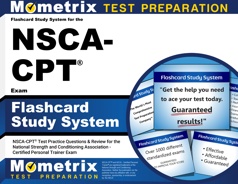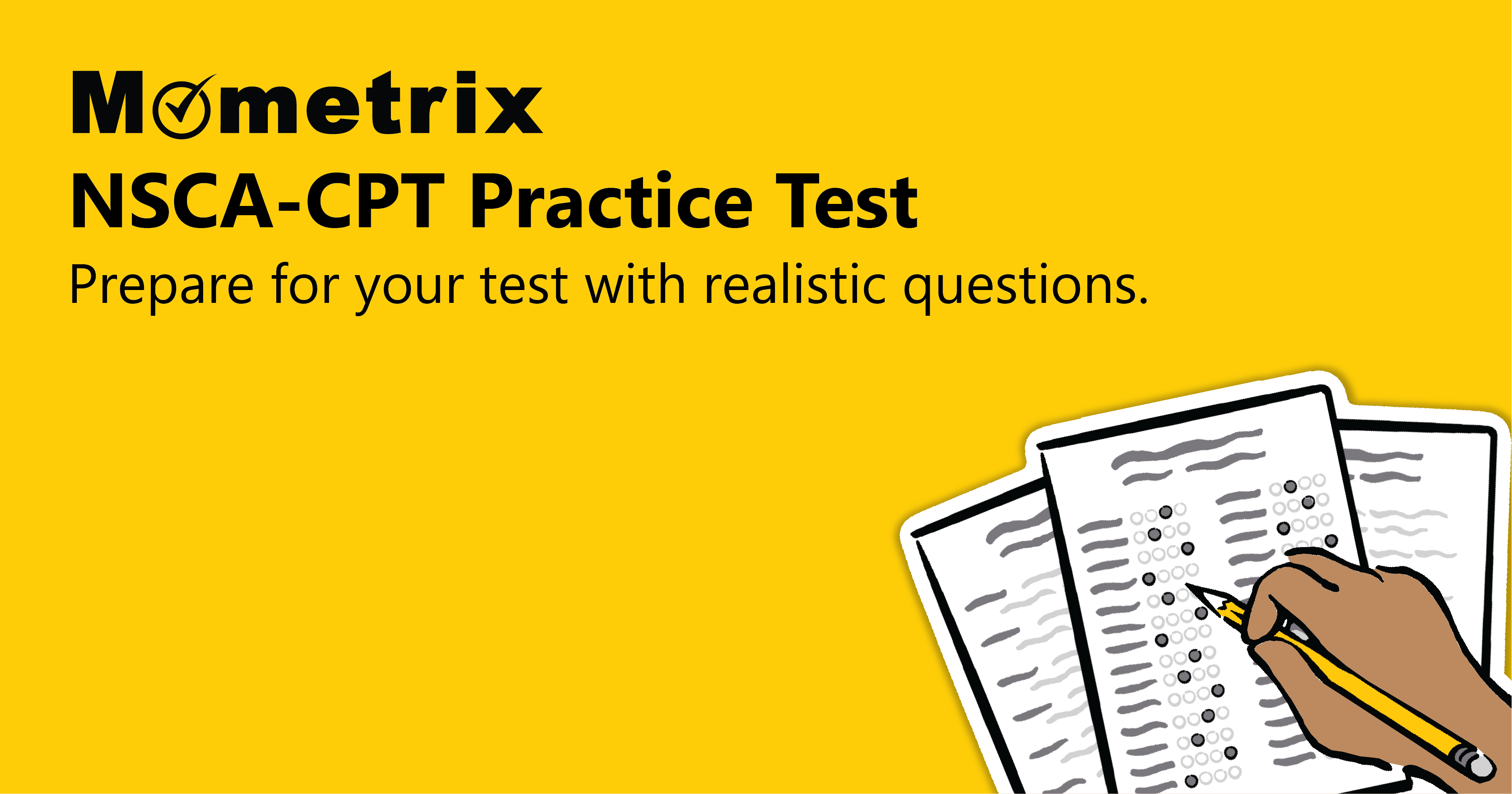NSCA-Certified Personal Trainer® (NSCA-CPT®) exam is administered by the National Strength and Conditioning Association (NSCA) to assess the knowledge and skills of prospective personal trainers.
Click “Start Test” above to take a free NSCA-CPT practice test, and check out our premium-quality NSCA-CPT test prep resources by clicking the links below!
Exam Eligibility
To be eligible for the exam, you must be at least 18 years old and meet the following education requirements:
- You must hold a high school diploma or some equivalent
- You must hold a current CPR/AED certification
NSCA-CPT Exam Outline
The NSCA-CPT exam contains 155 multiple-choice questions, 15 of which are unscored, and you will be given a time limit of 3 hours. The unscored questions are scattered throughout the exam and are unmarked, so you will not know which questions are scored and which are unscored.
Each scored question on the exam is categorized into one of three levels of complexity:
- Recall (Re): The ability to recall or recognize specific information
- Application (Ap): The ability to comprehend, relate or apply knowledge to new or changing situations
- Analysis (An): The ability to analyze and synthesize information, determine solutions, and/or evaluate the usefulness of a solution
The exam is split into four content domains.
1. Client Consultation/Assessment (32 questions)
The topics covered on this section of the exam are as follows:
- Initial interview
- Medical history and health appraisal
- Fitness evaluation
- Basic nutrition review
2. Program Planning (45 questions)
The topics covered on this section of the exam are as follows:
- Goal-setting
- Program design
- Training adaptations
- Special populations
3. Techniques of Exercise (43 questions)
The topics covered on this section of the exam are as follows:
- Machine resistance exercises
- Free weight exercises
- Flexibility exercises
- Calisthenic and body weight exercises
- Sport-specific activities
- Performance-related activities
- Cardiovascular machines
- Non-machine cardiovascular activities
- Alternative training activities
4. Safety, Emergency Procedures, and Legal Issues (20 questions)
The topics covered on this section of the exam are as follows:
- Safety procedures
- Emergency response
- Professional, legal, and ethical responsibility
Check out Mometrix's NSCA-CPT Study Guide
Get practice questions, video tutorials, and detailed study lessons
Get Your Study Guide
Registration
To register for the NSCA-CPT exam, you will need to create an NSCA account on their website. From there, you can apply and register for your exam. To apply, you will need to submit all of the necessary documents and transcripts.
Once your application is approved, you can log in to your account to register for and schedule your exam. You will need to pay the exam fee at this time, which is $300 for NSCA members and $435 for non-members.
Once the registration process is complete, you will need to schedule your exam with Pearson VUE. The exam is administered at Pearson VUE testing locations all across the country.
Test Day
On test day, you should arrive at the testing center about 30 minutes before your exam is scheduled to begin. Once you arrive, you will be asked to provide a valid, government-issued photo ID. If you fail to bring your ID or if your ID is expired, you will not be permitted to take the exam.
Once the check-in process is complete, you will be asked to leave all personal items in a secure locker outside the testing room. This includes your cell phone, bags, books, wallet, keys, and jackets.
Once the proctor has determined you are ready, you will be led into the testing room and given a small whiteboard and marker to use as scratch paper for notes.
Once the exam begins, you will be able to take a break at any point. However, the timer will not be paused during your break, so be aware of how long you are away.
How the NSCA-CPT Exam is Scored
You will receive two types of scores on your score report: raw and scaled. The minimum scaled score you need to pass the exam is 70. The raw score is simply the number of questions you answered correctly.
The pass rate for this exam is 66%.
Check out Mometrix's NSCA-CPT Flashcards
Get complex subjects broken down into easily understandable concepts
Get Your Flashcards
How to Study
How to Study Effectively
Your success on NSCA-CPT test day depends not only on how many hours you put into preparing but also on whether you prepared the right way. It’s good to check along the way to see whether your studying is paying off. One of the most effective ways to do this is by taking NSCA-CPT practice tests to evaluate your progress. Practice tests are useful because they show exactly where you need to improve. Every time you take a free NSCA-CPT exam practice test, pay special attention to these three groups of questions:
- The questions you got wrong
- The ones you had to guess on, even if you guessed right
- The ones you found difficult or slow to work through
This will show you exactly what your weak areas are and where you need to devote more study time. Ask yourself why each of these questions gave you trouble. Was it because you didn’t understand the material? Was it because you didn’t remember the vocabulary? Do you need more repetitions on this type of question to build speed and confidence? Dig into those questions and figure out how you can strengthen your weak areas as you go back to review the material.
Answer Explanations
Additionally, many NSCA-CPT practice tests have a section explaining the answer choices. It can be tempting to read the explanation and think that you now have a good understanding of the concept. However, an explanation likely only covers part of the question’s broader context. Even if the explanation makes sense, go back and investigate every concept related to the question until you’re positive you have a thorough understanding.
Comprehend Each Topic
As you go along, keep in mind that the NSCA-CPT practice test is just that: practice. Memorizing these questions and answers will not be very helpful on the actual test because it is unlikely to have any of the same exact questions. If you only know the right answers to the sample questions, you won’t be prepared for the real thing. Study the concepts until you understand them fully, and then you’ll be able to answer any question that shows up on the test.
Strategy for NSCA-CPT Practice
When you’re ready to start taking practice tests, follow this strategy:
- Remove Limitations. Take the first test with no time constraints and with your notes and NSCA-CPT study guide handy. Take your time and focus on applying the strategies you’ve learned.
- Time Yourself. Take the second practice test “open book” as well, but set a timer and practice pacing yourself to finish in time.
- Simulate Test Day. Take any other practice tests as if it were test day. Set a timer and put away your study materials. Sit at a table or desk in a quiet room, imagine yourself at the testing center, and answer questions as quickly and accurately as possible.
- Keep Practicing. Keep taking practice tests on a regular basis until you run out of practice tests or it’s time for the actual test. Your mind will be ready for the schedule and stress of test day, and you’ll be able to focus on recalling the material you’ve learned.
FAQs
Q
How many questions are on the NSCA-CPT exam?
A
There are 155 multiple-choice questions on the exam.
Q
How long is the NSCA-CPT exam?
A
The time limit for the exam is 3 hours.
Q
What is the passing score for the NSCA-CPT exam?
A
To pass the exam, you must achieve a scaled score of at least 70.
Q
How much does the NSCA-CPT exam cost?
A
The examination fee is $300 for NSCA members and $435 for non-members.
Q
How hard is the NSCA-CPT exam?
A
This exam is considered to be moderately difficult but easy enough to pass with an adequate amount of study and preparation. The current pass rate is 66%.
Q
What does NSCA-CPT stand for?
A
NSCA-CPT stands for National Strength and Conditioning Association (NSCA) Certified Personal Trainer (CPT).
Q
Can you use a calculator on the NSCA-CPT exam?
A
No, you will not be permitted to use a calculator during the exam.
NSCA-CPT® and NSCA – Certified Personal Trainer® are registered trademarks of the National Strength and Conditioning Association. Neither this publication nor the publisher have any affiliation with, or any recognition, sponsorship, or endorsement by, the NSCA.


